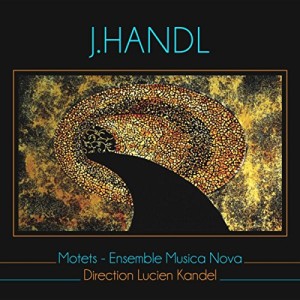J.Handl
Motets
Year : 2016
Co-production : Le Palais des dégustateurs – Musica Nova
Harmonia mundi distribution
Reference : PDD010
Sound recording and editing: Blaise Favre
Artistic direction : Marc Desmet
Duration : 73:13
Medium CD (1)
Towards the end of the Renaissance, the motet genre experienced a kind of golden age. Since the 1550s, works dedicated to this genre came about steadily one after another, with Giovanni Pierluigi da Palestrina composing nearly 300 and his contemporary Roland de Lassus more than 700. That is without taking into account the printed anthologies associated with this genre, which were circulated around big music publishing cities such as Venice, Nuremberg, Paris and Antwerp, and spread throughout all of Europe.
In Prague, at the centre of the Empire, music publishing also experienced a remarkable growth. This was enhanced by the establishment of the Habsburg residence in the capital Bohemia in 1583. Whilst Philippe de Monte, the appointed composer of Rudolf II’s imperial chapel, published around 250 of his motets primarily in Venice, evolving somewhat on the sidelines was the work of a more discreet author. Jacobus Handl succeeded at one the most ambitious projects devoted to this genre, in publishing 374 motets in close collaboration with the main publisher in Prague at the time, Jiří Nigrin.
Plainly entitled Opus musicum (Work of Music), this collection is exceptional in many respects. Made in a very short time (its four volumes were published between 1586 and 1591), its distinctive feature is that it is designed to follow the process of a liturgical year. This type of order had already been followed in some previous anthologies, particularly by Heinrich Isaac, the composer of Maximilian I, at the beginning of the century. However this was the first time that such achievement came from close collaboration between a composer and a publisher.
Handel was in fact a cantor in a small Romanesque church in Prague’s old town, just a few steps away from the Nigrin workshop where his brother George Handel worked as a publisher too, acting as an intermediary between the Church and the workshop press. Nigrin, who printed all kinds of books, from extemporary information sheets to major works on astronomy and botany, was fully aware of the importance of this publication. Within his catalogue of musical publishing, mostly provided from Bohemia, the Opus musicum is considered a masterpiece.
Marc Desmet, musicologist
Insérer musique
Planxit David at 8 (OM III, 29)
Christel Boiron
Esther Labourdette
cantus
Lucien Kandel
Xavier Olagne
tenors
Jérémie Couleau
Thierry Peteau
tenors
Marc Busnel
Guillaume Olry
bassus
With the participation of:
Josquin Gest
contretenor
Benjamin Ingrao
tenor
1. ASPICIENS A LONGE à 8 (OM I, 1)
2. IOCUNDARE FILIA SYON à 6 (OM I, 7)
3. RORATE COELI à 6 (OM I, 10)
4. EGREDIETUR VIRGA à 4 (OM I, 22)
5. HIERUSALEM CITO VENIET à 4 (OM I, 23)
6. DIES EST LAETITIAE à 8 (OM I, 29)
7. MISERERE MEI DEUS à 6 (OM I, 82)
8. PLANXIT DAVID à 8 (OM III, 29)
9. FILIAE IERUSALEM à 8 (OM II, 3)
10. PLANXIT DAVID à 8 (OM III, 29)
11. O VOS OMNES à 6 (OM II, 4)
12. RECESSIT PASTOR NOSTER à 4 (OM II, 12)
13. SEDIT ANGELUS à 6 (OM II, 37)
14. CHRISTUS SURREXIT à 6 (OM II, 39)
15. JESU NOSTRA REDEMPTIO à 6 ad aequales (OM II, 40)
16. QUID PLORAS MULIER à 8 in Echo (OM II, 55)
17. CUM REX GLORIAE à 8 (OM II, 30)


